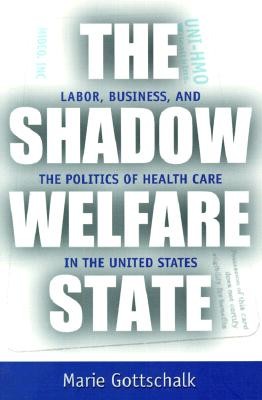
- We will send in 10–14 business days.
- Author: Marie Gottschalk
- Publisher: Cornell University Press
- ISBN-10: 0801486483
- ISBN-13: 9780801486487
- Format: 16.1 x 23.3 x 1.8 cm, minkšti viršeliai
- Language: English
- SAVE -10% with code: EXTRA
Reviews
Description
Why, in the recent campaigns for universal health care, did organized labor maintain its support of employer-mandated insurance? Did labor's weakened condition prevent it from endorsing national health insurance? Marie Gottschalk demonstrates here that the unions' surprising stance was a consequence of the peculiarly private nature of social policy in the United States. Her book combines a much-needed account of labor's important role in determining health care policy with a bold and incisive analysis of the American welfare state. Gottschalk stresses that, in the United States, the social welfare system is anchored in the private sector but backed by government policy. As a result, the private sector is a key political battlefield where business, labor, the state, and employees hotly contest matters such as health care. She maintains that the shadow welfare state of job-based benefits shaped the manner in which labor defined its policy interests and strategies. As evidence, Gottschalk examines the influence of the Taft-Hartley health and welfare funds, the Employee Retirement Income Security Act (E.R.I.S.A.), and experience-rated health insurance, showing how they constrained labor from supporting universal health care. Labor, Gottschalk asserts, missed an important opportunity to develop a broader progressive agenda. She challenges the movement to establish a position on health care that addresses the growing ranks of Americans without insurance, the restructuring of the U.S. economy, and the political travails of the unions themselves.
EXTRA 10 % discount with code: EXTRA
The promotion ends in 22d.19:34:11
The discount code is valid when purchasing from 10 €. Discounts do not stack.
- Author: Marie Gottschalk
- Publisher: Cornell University Press
- ISBN-10: 0801486483
- ISBN-13: 9780801486487
- Format: 16.1 x 23.3 x 1.8 cm, minkšti viršeliai
- Language: English English
Why, in the recent campaigns for universal health care, did organized labor maintain its support of employer-mandated insurance? Did labor's weakened condition prevent it from endorsing national health insurance? Marie Gottschalk demonstrates here that the unions' surprising stance was a consequence of the peculiarly private nature of social policy in the United States. Her book combines a much-needed account of labor's important role in determining health care policy with a bold and incisive analysis of the American welfare state. Gottschalk stresses that, in the United States, the social welfare system is anchored in the private sector but backed by government policy. As a result, the private sector is a key political battlefield where business, labor, the state, and employees hotly contest matters such as health care. She maintains that the shadow welfare state of job-based benefits shaped the manner in which labor defined its policy interests and strategies. As evidence, Gottschalk examines the influence of the Taft-Hartley health and welfare funds, the Employee Retirement Income Security Act (E.R.I.S.A.), and experience-rated health insurance, showing how they constrained labor from supporting universal health care. Labor, Gottschalk asserts, missed an important opportunity to develop a broader progressive agenda. She challenges the movement to establish a position on health care that addresses the growing ranks of Americans without insurance, the restructuring of the U.S. economy, and the political travails of the unions themselves.


Reviews